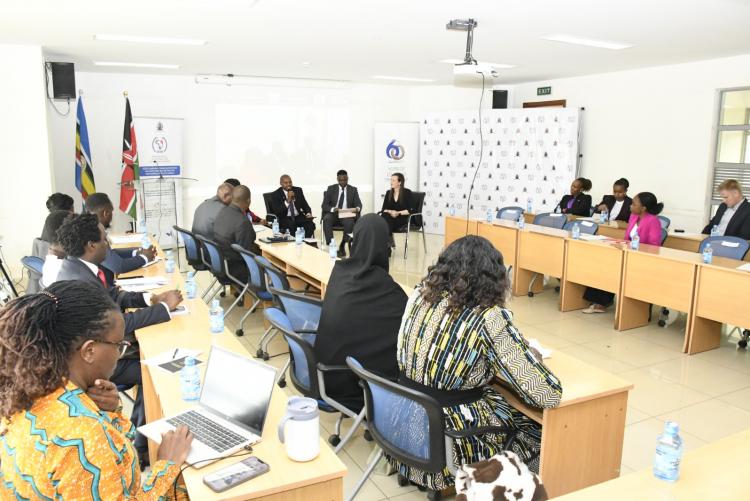The African Centre for the Study of the United States (ACSUS), under the Faculty of Arts and Social Sciences, hosted a high-level panel discussion on Tuesday, July 1, 2025, at the University of Nairobi Towers (10th Floor), to commemorate 60 years of U.S.–Kenya partnership in education and cultural exchange. The event, held under the theme “Sharing Knowledge for Lasting Impact,” brought together scholars, alumni, diplomats, education experts, and diaspora leaders to reflect on the strong and evolving relationship between the two nations, anchored in shared values and people-to-people ties.
For over six decades, more than 50,000 Kenyan students have studied in the United States through various exchange programs, scholarships, and academic collaborations. These initiatives have nurtured a generation of professionals who now lead across sectors such as technology, policy, education, entrepreneurship, and diplomacy. The panel celebrated these achievements while also engaging participants in a dialogue about the future of educational cooperation in today’s digital and globalized world.
Speaking during the event, Professor Maluki, Chair of the Department of Diplomacy and International Studies, welcomed the participants and remarked, “On behalf of the Department of Diplomacy and International Studies at the University of Nairobi, it is my pleasure to warmly welcome you to today’s seminar: ‘Celebrating 60 Years of U.S.–Kenya Partnership in Education & Cultural Exchange: Sharing Knowledge for Lasting Impact.’
Professor Jack Odhiambo, Dean of the Faculty of Arts and Social Sciences, who emphasized the significance of the day. He stated, “Today, we mark a truly remarkable milestone—sixty years of enduring partnership between Kenya and the United States in the sphere of education and cultural exchange. Sixty years of shared learning, mutual respect, and the weaving of people-to-people ties that have outlived political cycles and transformed lives in ways that are often quietly powerful.” He added, “This panel reminds us of the power of cultural and academic exchange to shape more inclusive and collaborative futures. Beyond marking 60 years of partnership, today’s event calls us to look ahead—building on past gains to foster even greater impact. I thank the African Centre for the Study of the United States (ACSUS) for organizing this event, and each of you for being part of this important conversation. May today’s dialogue inspire fresh ideas, deeper understanding, and lasting connections.”
The panel featured distinguished voices from both Kenya and the United States, each of whom shared personal stories and professional reflections on the power of education to transform lives. Caroline Gray, a U.S. Fulbright Scholar and Senior Geopolitical Analyst at Ergo, joined virtually to speak about the global significance of educational diplomacy. Amos Bungei, a Kenyan Fulbright Scholar and Graduate Research Fellow at Syracuse University, spoke of how studying in the United States broadened his academic perspective and deepened his leadership skills. Peter Ndua, a Kenyan diaspora entrepreneur and CEO of Kusini Coffee, reflected on how his international experiences inspired his mission to build a socially conscious business that connects back to Kenya. Lisa Maroni, the Regional Manager for East and Southern Africa at EducationUSA, gave an overview of the positive impact that U.S.-sponsored programs such as Fulbright, YALI, and the Mandela Washington Fellowship have had in promoting leadership, mentorship, and intercultural learning across the continent.
Moderating the discussion was Ella Wafula, Vice President of the U.S.–Kenya Alumni Association and alumna of the International Visitor Leadership Program (IVLP), who steered the conversation around critical themes such as how universities, governments, and the private sector can work together to strengthen academic exchanges, drive innovation, and build institutional capacity. The conversation was grounded in three objectives: to reflect on the historical and current impact of U.S.–Kenya exchange programs; to promote intercultural learning as a powerful tool for diplomacy and development; and to explore new strategies for expanding educational access and research collaboration across borders.
As the discussion came to a close, panelists and attendees agreed that this milestone is not just a moment to celebrate past successes, but also a call to look forward—to deepen partnerships, expand opportunities, and invest in the next generation of changemakers. The event reaffirmed ACSUS’s important role as a hub for research, dialogue, and academic exchange that strengthens Kenya’s understanding of and engagement with the United States. With education and cultural exchange as central pillars, the U.S.–Kenya partnership continues to create lasting impact and shape a more connected, inspired, and innovative future.

